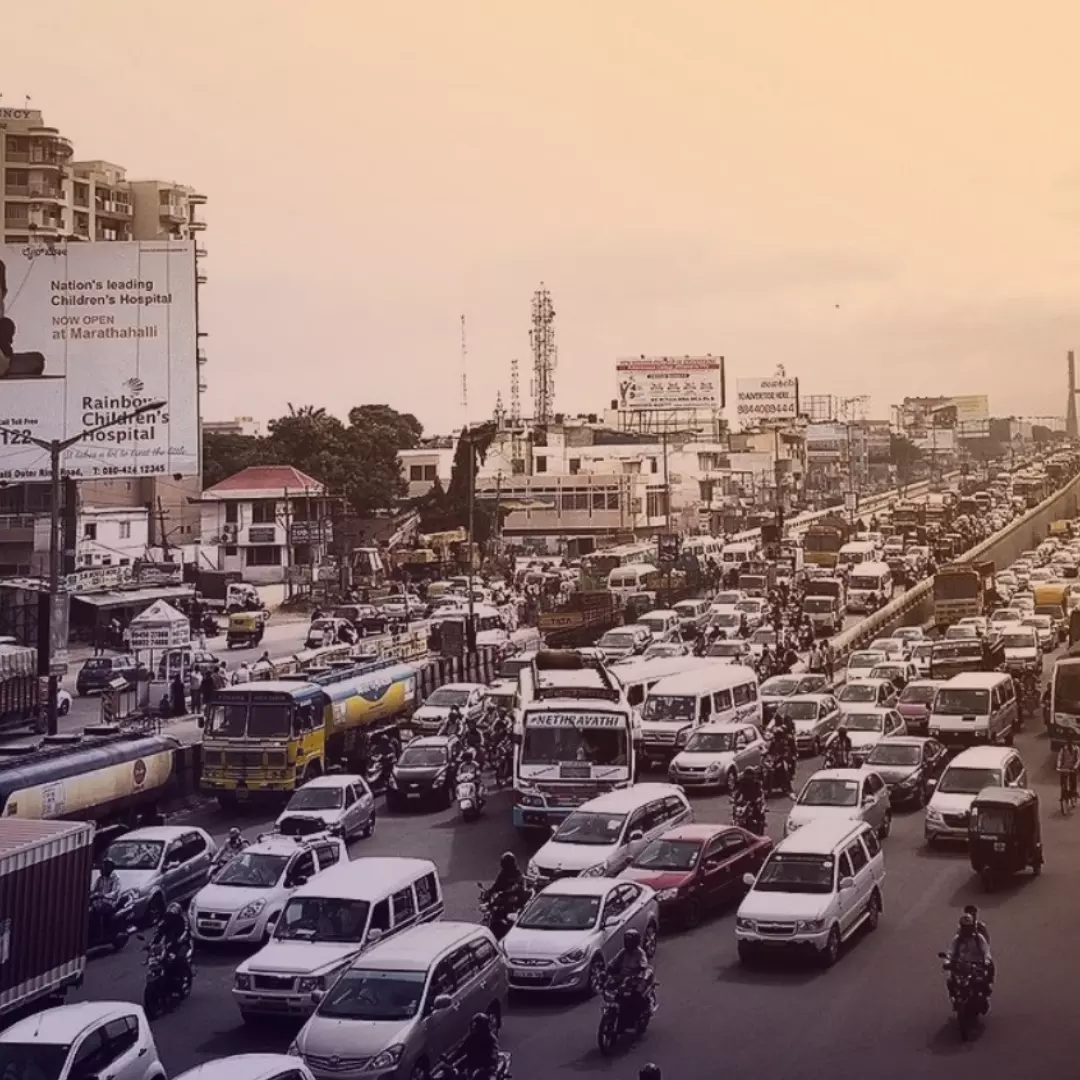Bengaluru, a city known for its thriving tech industry, is facing significant economic losses due to traffic congestion and delays, according to a recent report by traffic expert M N Sreehari and his team. The study reveals that the city incurs an annual loss of ₹ 19,725 crore due to various factors, including traffic delays, congestion, stoppages at signals, fuel loss, and more.
Despite having 60 fully functional flyovers in the city, the infrastructural deficit and lack of proportionate road length growth with the increasing vehicular population have led to significant transportation issues. The city’s population has grown exponentially to 14.5 million, with close to 1.5 crore vehicles.
The report suggests that Bengaluru needs to expand its area from the current 985 square kilometers to 1,100 square kilometers to accommodate the growing population and infrastructural demands. The experts propose the development of radial roads, ring roads, and circular routes to address transportation needs effectively.
To cater to the road traffic for the next 25 years, the study recommends exploring more underground-based road systems, especially for metro transportation and government buses. It also calls for the removal of roadside parking to prioritize road space for traffic and ensure pedestrian safety on footpaths, as per a report in NDTV.
Sreehari also said, “As a transportation expert, I have failed to show even one road in Bengaluru without parking”.
The city’s growth in the IT sector has attracted more people, but the infrastructural growth has not kept pace, resulting in significant economic losses and inconvenience to commuters. The study serves as a call for authorities to focus on robust road planning, traffic management, and infrastructural development to address the mounting transportation challenges in Bengaluru.
The team also recommended an increase in mass transportation like metro, monorail, and high-capacity buses and discouraged private transportation systems. The usage of artificial intelligence and robotics introduction with informatics for road users using VMS [Variable Message System] was also recommended.
“Deploy enough personnel for the observation of violators and immediate action plans in addition to camera and sensor system. Since the entire road system is full of activities, exploring underground transportation, particularly for metros, government buses etc., gives opening every one or two kilometres and escape routes. This will also cover ventilation and other requirements during the disaster,” the report said.
Global Ranking Of Traffic Congestion
Despite the Covid-induced lockdowns in 2021, Mumbai and Bengaluru have still experienced significant urban congestion, ranking 5th and 10th, respectively, in a global ranking of 404 cities across 58 countries. Delhi and Pune also featured in the list, securing the 11th and 21st spots. The ranking was based on a report by a global location technology company, TomTom Traffic Index.
Interestingly, despite the congestion, the level of traffic in Delhi during 2021 was 14% less than in 2019, while Mumbai, Bengaluru, and Pune witnessed a drop of 18%, 32%, and 29%, respectively, during the same period. This suggests that even with reduced traffic due to lockdowns, these cities still faced considerable congestion challenges.
Istanbul topped the global ranking, followed by Moscow. The presence of four Indian cities in the global top 25 list highlights the severity of traffic congestion in the country’s major urban centers, despite the Covid-related disruptions. The report sheds light on the need for effective traffic management and infrastructural improvements to address the congestion issues in these cities.
The latest report also highlighted that India’s overall congestion level in 2021 was 23% lower compared to pre-Covid times, with a significant decrease of 31% during peak hours. This improvement can be attributed to the impact of Covid-induced lockdowns and restrictions, which resulted in fewer vehicles on the roads.
In the previous edition of the traffic index report in 2020, three major Indian cities – Mumbai, Bengaluru, and Delhi – were among the top 10 most congested cities in the world. Mumbai held the second position, Bengaluru ranked sixth, and Delhi secured the eighth spot among 416 cities across 56 countries, reported The Times Of India.
However, in 2021, the congestion level in Delhi decreased to 48 points from 53 points in 2019, with a 17% reduction in peak traffic congestion. Despite this improvement, the city faced challenges during its worst traffic day on August 21, which coincided with heavy rainfall and resulted in waterlogged areas, leading to widespread traffic logjams and increased congestion levels.
The report highlights the positive impact of reduced traffic during the pandemic but also underlines the need for continued efforts to manage traffic congestion effectively in Indian cities. As the economy and mobility activities recover, maintaining a balance between traffic flow and infrastructure development will be crucial to sustain these improvements.
Also Read: Nuh Violence: Several Shops Vandalized By Miscreants, Internet Ban To Continue
https://thelogicalindian.com/h-upload/2023/08/07/500x300_232810-web-31-2.webp
Trending
2023-08-07 08:46:42.0
Bengaluru Loses Around Rs 20,000 Crore Due To Traffic Hindrances, Says Study By Expert












